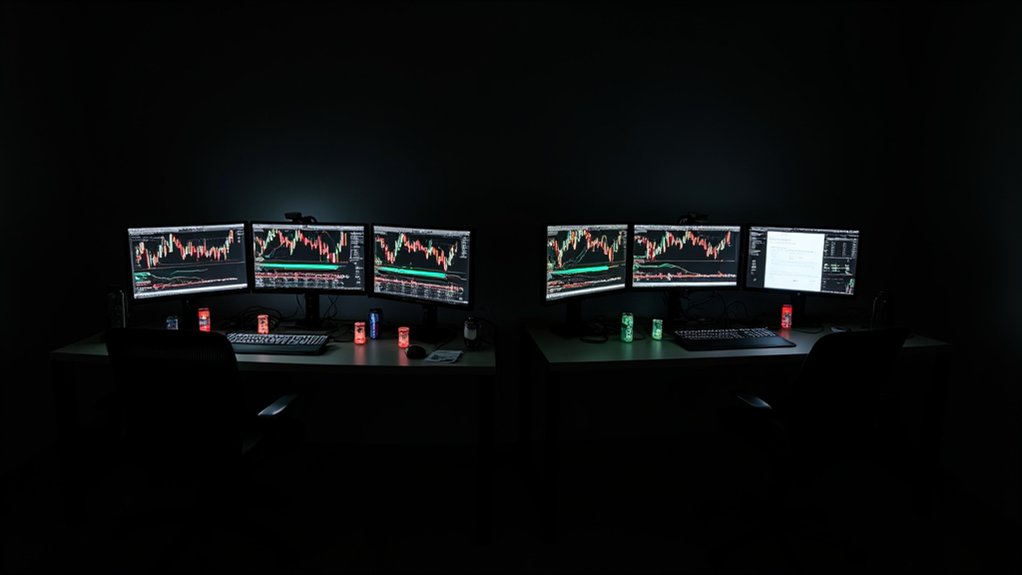Forex traders stay motivated by setting SMART goals—specific, measurable, achievable, relevant, time-bound targets that beat vague “get rich” fantasies every time. Structured routines and disciplined record-keeping reduce decision fatigue when markets turn chaotic. Robust risk management with pre-defined stop-losses protects capital and sanity simultaneously. Continuous learning keeps confidence intact despite evolving dynamics, while trading communities buffer against the isolation that breeds burnout. Emotional control separates survivors from casualties when currency swings ignore feelings entirely. The mechanics behind these psychological safeguards reveal why some traders endure while others flame out.

Every day, thousands of traders across Africa wake up, open their charts, and wonder if they've got what it takes to keep going. The Forex game isn't short on promises. But staying motivated when the Nigerian Naira swings wildly, when South African data drops unexpectedly, or when your Kenyan broker's platform freezes mid-trade? That's where most people crack.
Emotional control separates survivors from casualties. Research shows heightened stress and poor coping lead directly to impulsive decisions and losses. Traders in Lagos, Cairo, and Johannesburg face this daily. Market chaos doesn't care about your feelings. Developing resilience through emotional mastery increases the probability of long-term success. Awareness of cognitive biases and personal triggers helps keep decision-making neutral. High emotional involvement? That's the express lane to burnout and suboptimal outcomes.
SMART goals—Specific, Measurable, Achievable, Relevant, Time-bound—give clarity when markets feel like a casino. Clearly defined targets reduce uncertainty and streamline focus toward actionable tasks. A trader in Accra aiming to “make money” will flounder. One targeting a 2% monthly return with defined risk parameters has direction. Attainable objectives lower stress and boost satisfaction when milestones hit. Unrealistic targets breed disappointment and disengagement fast.
Structured routines foster discipline and reduce cognitive load during decisions. Consistency in applying rules counterbalances emotional reactions and impulsivity. A Nairobi trader following pre-set routines minimizes decision fatigue and preserves willpower for critical moments. Set schedules balance work-life commitments, reducing chronic stress and energy depletion. Habitual record-keeping enables objective performance review and ongoing strategy optimization. A meticulous trading plan containing specific targets and actionable techniques provides the framework needed to achieve consistent results. Maintaining consistent rules throughout your trading activities ensures that decisions remain objective rather than emotionally driven. Recognizing signs of trading fatigue early allows you to step back before exhaustion leads to costly mistakes.
Pre-defined risk levels per trade minimize emotional volatility and protect capital. Robust risk management guarantees long-term survival and prevents sudden, debilitating losses. Acceptance of occasional losses as inherent avoids emotional overreaction. Stop-loss orders maintain discipline by automatically exiting positions at predetermined levels, removing emotion from critical moments. Stop-loss and take-profit limits maintain objectivity under pressure. Lower-risk approaches experience less fluctuation and reduced burnout compared to reckless high-risk methods. Implementing disciplined strategies helps traders avoid impulsive reactions driven by fear or greed during high-pressure market situations.
Ongoing education maintains confidence despite changing dynamics. Continuous learning on trends and analytical techniques enables adaptation, ensuring relevance. A Moroccan trader who stopped learning three years ago is trading blind today. Engagement with trading communities or mentors provides social reinforcement and alternative viewpoints. Successful traders demonstrate psychological resilience by maintaining composure during volatile market conditions and learning from both wins and losses. Keeping a journal aids in learning from mistakes and recognizing consistent patterns for improvement.
Building connections with other traders buffers against isolation and demotivation. Peer discussions in Kampala, Dakar, or Harare offer new perspectives. Trading alone is a recipe for despair. Support systems matter.
Common Questions
How Do Power Outages in My African Country Affect Trading Motivation?
Power outages kill trading momentum fast. Nigerian traders faced 12 grid collapses in 2024 alone—nationwide blackouts lasting hours, sometimes days. South Africa saw rolling blackouts 289 days in 2023. Can't close trades, can't catch opportunities.
The psychological toll? Brutal. Constant stress, anxiety over missing market-moving news mid-blackout, fear of blown accounts. Traders in DRC and Burundi endure 12+ cuts monthly. That's 144 days yearly without power in some regions. Frustration builds, motivation erodes, burnout follows. It's not laziness—it's infrastructure failure wearing traders down.
Can I Trade Forex Profitably With Limited Capital in Nigeria or Kenya?
Yes, it's possible—but not easy. Traders in Nigeria and Kenya start with as little as $10, no minimum deposit required from many brokers.
Small accounts earning KSh 500–1,000 daily exist in Kenya. Reality check: most beginners lose money first.
Average monthly returns sit between 1–10% with limited capital. Discipline, education, and risk management separate the few who profit from the majority who don't.
Over 200,000 active traders across both countries keep trying anyway.
Which African Brokers Offer Best Withdrawal Options to Avoid Frustration?
IC Markets, Exness, AvaTrade (Official Site 🔗), and FBS top the list for African traders chasing fast withdrawals. IC Markets pushes instant payouts via Skrill, Neteller, PayPal—no minimum.
Exness handles NGN withdrawals, huge in Nigeria.
AvaTrade dominates for overall reliability across the continent.
FBS does same-day processing.
E-wallets clear in under 60 minutes, sometimes free.
Local currency options (NGN, ZAR) cut conversion headaches.
FSCA-regulated brokers publish fees upfront, offer 24/7 support, weekend processing.
Transparency matters—delays kill trust fast.
How Do Currency Restrictions in Zimbabwe or Egypt Impact Trading Psychology?
Currency restrictions crush trader confidence in both countries. Zimbabwe's planned dollar phase-out by 2025 and Egypt's parallel market chaos create constant anxiety about whether positions can be closed or funds withdrawn. Traders shift to ultra-short-term plays, preserving capital instead of building strategies.
Skepticism runs deep—past currency reforms failed, so why trust this time? Exporters in Zimbabwe face forced local currency conversions, limiting hard currency access. Egypt's official versus black market spread makes actual value anyone's guess.
Result? Defensive, emotionally draining trading full of second-guessing.
Should I Quit My Day Job to Trade Forex Full-Time in Africa?
Not advisable. Most African traders lose money—90% fail to profit consistently.
Income volatility is brutal, especially with unstable currencies in places like Zimbabwe or Nigeria.
South Africa offers better regulation, but even there, only 10% succeed long-term.
No guaranteed salary.
High stress.
Internet outages can wreck trades.
Full-timers need serious capital and expertise.
The 1.3 million traders across Africa? Tiny fraction actually make sustainable income.
Keep the day job.
Trade part-time first.











